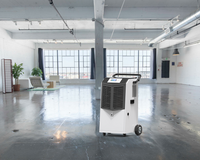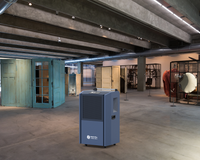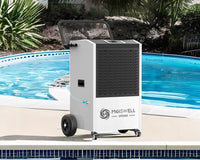Basements and crawl spaces are essential parts of many homes and commercial buildings, providing valuable storage and utility spaces. However, these areas are also susceptible to humidity issues that can have far-reaching consequences if left unaddressed. In this article, we'll explore the common humidity problems that plague basements and crawl spaces and discuss the importance of using commercial dehumidifiers to maintain a healthy and functional environment.
The Challenges of High Humidity in Basements and Crawl Spaces:
Mold and Mildew Growth: High humidity levels create the ideal breeding ground for mold and mildew. These unsightly and potentially harmful fungi can proliferate on walls, ceilings, and even belongings stored in these areas.
Structural Damage: Prolonged exposure to excess moisture can cause structural issues in basements and crawl spaces. Wooden beams, joists, and support columns are particularly vulnerable to rot and decay, which can compromise the integrity of the entire building.
Musty Odors: Elevated humidity often leads to musty odors that can permeate the entire home or building. These odors are unpleasant and challenging to eliminate without addressing the underlying humidity problem.
Health Concerns: High humidity can create an environment conducive to the growth of dust mites and other allergens, potentially exacerbating respiratory issues for occupants.
Damage to Belongings: Items stored in basements and crawl spaces, such as clothing, documents, and electronics, can be damaged or ruined by moisture. This can result in financial losses and emotional distress.
The Role of Commercial Dehumidifiers:
Commercial dehumidifiers play a crucial role in resolving humidity issues in basements and crawl spaces. Here's how they can help:
Moisture Control: Commercial dehumidifiers are specifically designed to extract excess moisture from the air efficiently. This helps maintain optimal humidity levels, preventing mold growth and structural damage.
Improved Air Quality: Dehumidifiers filter the air as they remove moisture, reducing airborne contaminants such as dust, allergens, and odors. This leads to improved air quality in the basement or crawl space.
Structural Preservation: By controlling humidity, dehumidifiers protect the structural integrity of the space, preventing rot and decay in wooden components and other materials.
Energy Efficiency: Commercial dehumidifiers are designed to operate efficiently, minimizing energy consumption while effectively removing moisture. This efficiency contributes to lower utility bills.
Health and Comfort: Maintaining the right humidity level enhances occupant comfort and reduces the risk of respiratory issues caused by mold and allergens.





